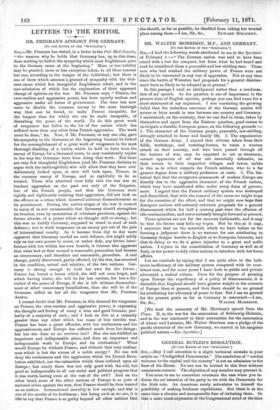LETTERS TO THE EDITOR.
MR. FREEMAN'S APOLOGY FOR GERMANY.
[TO THE EDITOR OF THE "SPECTATOR."] SIR,—Mr. Freeman has stated, in a letter to the Pall Mall Gazette, "the reasons why he holds that Germany has, up to this time, done nothing to forfeit the sympathy which most Englishmen gave to the German cause at the beginning." More or less validity may be granted, more or less exception taken, to all these reasons but one, according to the temper of the individual ; but there is one of them which assumes a ground of sympathy with the Ger- man cause which few thoughtful Englishmen admit, and in the non-admission of which lies the explanation of their apparent change of opinion on the war. Mr. Freeman says, " France, the ever-restless and aggressive power, has been equally restless and aggressive under all forms of government. The time has now come to disable the common enemy in the most thorough way that can be found, to make France incapable, for the longest time for which she can be made incapable, of disturbing the peace of the world. To do this great work of vengeance has fallen to the lot of the nation which has suffered more than any other from French aggression. The work must be done," &c. Now, if Mr. Freeman, or any one else, gave his sympathy to the Germans at the beginning because he looked for the accomplishment of a great work of vengeance in the most thorough disabling of a nation which he held to have been the enemy of Europe for a thousand years, he may consistently rejoice in the way the Germans have been doing that work. But there are very few thoughtful Englishmen (and Mr. Freeman disdains to argue with the unthoughtful) who will allow that they have ever deliberately looked upon, or ever will look upon, France, as the common enemy of Europe, and as rightfully to be so treated. Those who admitted most fully that the war was an insolent aggression on the part not only of the Emperor, but of the French people, and that the Germans were rightly and righteously resisting that aggression, did not look on the offence as a crime which deserved national dismemberment as its punishment. During the earlier stages of the war it seemed to many of us not unreasonable that Germany should strengthen its frontier, even by annexation of reluctant provinces, against the future attacks of a power which we thought still so strong ; but this was to fortify Germany, supposed to stand in need of such defence ; not to work vengeance on an enemy put out of the pale of international comity. As it became from day to day more apparent that Germany needed no such defence, but might safely rely on her own power to resist, or rather defy, any future inter- ference with her within her own bounds, it became also apparent that what had at first seemed a reasonable precaution had become an unnecessary, and therefore not reasonable, procedure. A real change, partly discovered, partly effected, by the war, has occurred in the condition, actual and relative, of the two nations. Ger- many is strong enough to hold her own for the future ; France has learnt a lesson which she will not soon forget, and which having learnt, she will be far less restless, far less a dis- turber of the peace of Europe, if she is left without dismember- ment or other unnecessary humiliations, than she will be if the Germans inflict on her all the vengeance that Mr. Freeman desires.
I cannot doubt that Mr. Freeman, in this demand for vengeance on France, the ever-restless and aggressive power, is expressing the thought and feeling of many a wise and good German, pro- bably of a majority of such ; and I look on this as a calamity greater than any other which has come of this terrible war. France has been a great offender, with her restlessness and her aggressiveness, and Europe has suffered much from her doings ; but has she done us no services too? Has she not fulfilled an important and indispensable place, and done an important and indispensable work in Europe and its civilization? What would Europe be without France, and without that very restless- ness which is but the excess of a noble energy ? No one will deny the restlessness and the aggression which the French Revo- lution exhibited, nor the calamities which these inflicted upon all Europe ; but surely there was not only good with the evil, but good so indispensable to all our social and political progress that it was worth having even at the cost of the evil? And on the other hand, none of the other nations of Europe is so pure of national crime against the rest, that France should be thus treated as an outlaw. International morality is low enough, and war is one of the results of its feebleness ; but being such as we are, it is idle to say that France is so guilty beyond all other nations that
she should, as fax as possible, be disabled from taking her wonted place among them.—I am, Sir, &c., EDWARD STRACHEY.






























 Previous page
Previous page